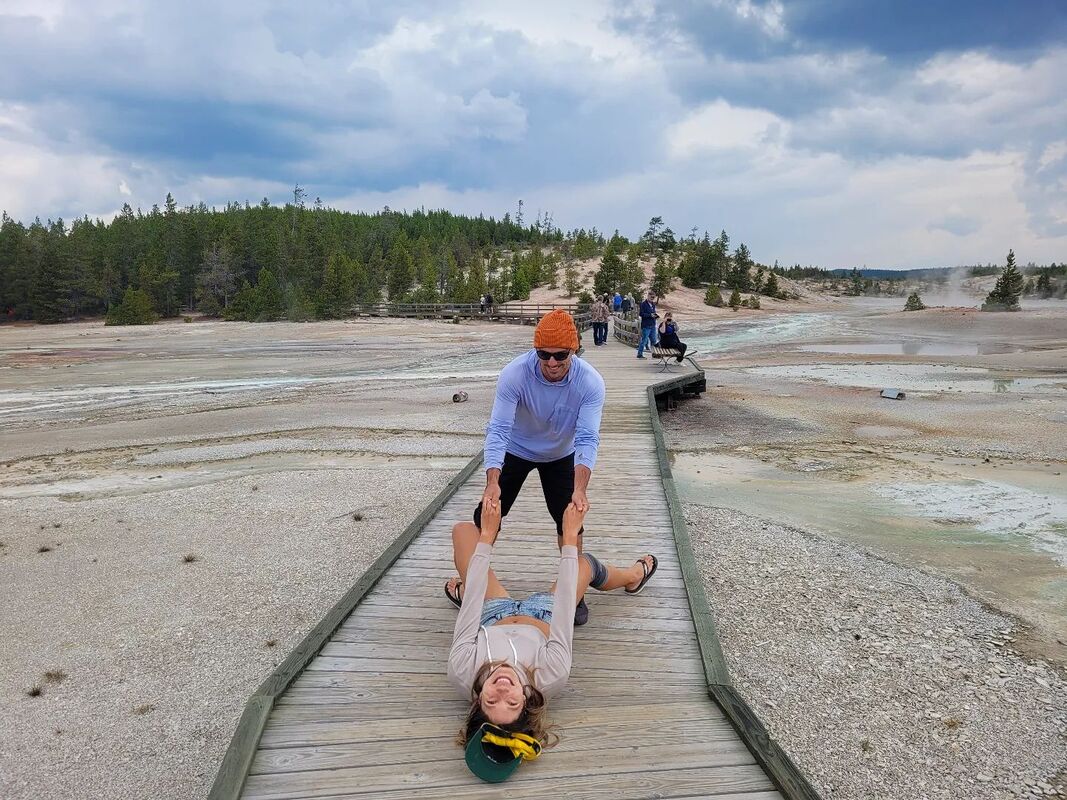|
Just because "your intentions are good" doesn't mean you aren't causing harm.
When someone you love, or even just like, suffers a loss, it can be hard to know what to say to them. Which is silly. There actually are PLENTY of things you can say to them that will help. And there are plenty of things you can say that basically mean, "Fuck you." Doing the one and avoiding the other is actually quite easy. We'll start with what not to say, as that's the title of the post. Since the purpose of saying something to your liked or loved one is to comfort them, avoid self-indulgent comparisons. Believe it or not, people whose mom just died don't actually want to hear stories about your mom or dog or friend or whatever who died. It isn't helpful. A while back, this weird Facebook post went viral in which some self-obsessed person spent 10 paragraphs justifying why they constantly interrupt their friends to tell a similar (but, you know, better) story, "to show I'm listening." That post was bullshit. Interrupting someone's story to tell your own story proves you don't care about their story. If you did care about their story, you'd, like... let them tell it. Maybe, just maybe, even ask follow-up questions and shout exclamations in all the right places because you're deeply engaged in what they're saying. Stop overjustifying self-indulgence and shitty listening in order to satisfy your ego. Similarly, when someone is talking about a recent loss, don't interrupt and one-up them with stories about your own loss. It isn't helpful. It's actually pretty self-centered to imagine every grief and loss and relationship is the same as yours. If you want to be helpful, listen. Impulse control can be hard for some people. But here's one thing that is really, REALLY easy to avoid saying, and it doesn't take any impulse control whatsoever -- just a minuscule amount of basic human empathy: "You should go for a run!" I have this weird aunt who interrupted me when I was trying to talk about a very recent, very profound loss to tell me to go for a run. I was really surprised when she did it, because she's a pastor's wife, and I kind of expected, like... a rudimentary level of social awareness from her. But no. I wanted to talk about the person I lost, and my aunt wanted me to fuck off and go for a run. I guess she was busy that week. Or she never cared in the first place. Or she somehow got the idea that the problem is that I am fat, and not that someone I love had died. (Which, as any stranger who follows me on the internet would know, is not the problem... my abs are a washboard, bro. #ChooseBeautiful #StopTellingAmazingWomenToBeLess)
Image: The Happy Talent on Instagram
A few weeks later, I was talking to a good friend about my loss, and he told me I should go for a run. I laughed, because I thought he was making fun of my aunt. When he looked confused by my laughter, I realized he wasn't joking. Turns out, he, like millions of other Americans, saw Legally Blonde as a child, and thought he was now an expert on endorphins. To his credit, he instantly realized what a stupid and shitty thing he'd said, and apologized. "My intentions were good," was all he said in his defense. But the thing about having good intentions, as I wrote in For the Love of God, STOP Asking People If They're Okay! (Ask This Instead), is that just because your intentions are good, doesn't mean you're not causing harm. Psychology study after psychology study after clinical trial after public policy initiative after education reform prove this. You can have the greatest intentions and the purest heart in the whole world... But still cause harm. One thing that I thought was very funny in the aftermath of For the Love of God, STOP Asking People If They're Okay! (Ask This Instead), which is often one of my most popular posts, even years later, is how many people read the research, and instead of asking themselves, "Do I do that? Am I causing harm? What could I do better to help people I love?" doubled down on the thing they were doing wrong... Almost as though it's more about protecting their ego than helping their friends and family. Almost. Now you know one reasonably easy thing not to do (interrupt and compare) and one really easy thing not to say ("Go for a run, fatty!"). So what should you say? What should you do? This, too, is surprisingly easy. 1. If you know the person who died, tell stories about them. When someone dies, the bereaved fear forgetting. They regret the questions they never got to ask and the stories they never got to hear. Sharing memories and photos of the person provide respite from the pain of loss and fear of forgetting. If you're not sure if you should share photos, ASK. "Would you like it if I sent you some photos from the wedding? Your mom was my bridesmaid!" If the bereaved thinks it would be too painful or too soon, they'll let you know -- and maybe follow up with you in a few weeks or months when they are ready. 2. If you didn't know the person, you can ask questions about them. When people suffer a great loss, that loss can be all they think about. Asking questions provides a chance to talk about the person they love. If you're not sure, ASK. "I'd love to hear more about your dad. Do you want to talk about him, or is it too soon?" If they say no, proceed to: 3. Talk about your day. Even if you think it was a pretty routine, boring day. This serves two important functions. First, it provides a brief distraction from their constant pain. During my grief, I appreciated the many friends who would call or message me to tell me about an annoying incident at the food truck, a missed doctor's appointment, a song they're working on, property damage from Hurricane Ian... or even just their cat. It meant that for a few minutes, I didn't have to be in constant pain.
"Bruhhhh, I was thinking about our Yellowstone trip! Remeber?!" Yes, I do. And now, for like five minutes, I don't feel so sad anymore. Image: The Happy Talent
Second, it is an action that is high in communion (ie, affection, care, closeness), which is very helpful to someone who has lost a major source of affection, care, and closeness in their life. Someone who's lost the person they used to talk to most, or whom they used to call when they were happy, sad, or bored. Psychologically, this is exactly what someone in this position needs. They don't need some insensitive dickhead to tell them to fuck off and go for a run. (Although! "Let's go for a run" could actually be helpful, as it's a high-communion offer to spend time together, and not an invitation to lose weight and leave me alone.) 4. Offer to help (or just help without offering). Show up and do their laundry. Bring them a burrito. Tune their bike. Help them plan the funeral. Bring them coffee. Caulk their windows. Grief is exhausting, and all the legal and emotional and funeral stuff takes a toll. Even small chores can feel insurmountable. Moreover, these are all actions that are high in communion. They demonstrate actual care. They make someone who is worried about how they're going to survive the rest of their life without the person they lost feel a little safer, a little more cared for. *** Obviously, these actions will not solve the problem. The problem is not solvable. You cannot solve it. But, with a small amount of thought and sensitivity, you can provide brief moments of comfort and relief... And maybe even short bursts of joy and laughter in someone's darkest hour.
6 Comments
Whether it was "just" a job, a relationship, a pet, or a person, the loss is real and valid, and telling someone to just get over it is incredibly insensitive. grief is a process, and telling someone to hurry up and move on is not only idiotic, but also dismissive of the very real pain that person is feeling.
Reply
Jadzia
3/14/2023 08:57:57 am
This is one where there's no clear formula. It depends on the person and context. For example, I lost my grandmother recently. I have discussed the matter quite a lot at work. A younger colleague who is new to the organisation lost his grandmother around the same time. He has shown no desire to talk about it so I have followed his lead and said nothing beyond offering condolences.
Reply
Mehdi
3/31/2023 02:06:59 pm
Oh no, are the Quora mods anti-woman, anti-feminist, anti-biology?
Reply
3/31/2023 02:46:13 pm
Yes, they are. But like everyone in the world already knows that, and male supremacists like yourself revel in it. That is, when you're not sending me death and rape threats one minute, then claiming that you "just want to pee" the next.
Reply
Mehdi
3/31/2023 11:45:24 pm
Most trans women do indeed "just want to pee" and just want to get on with their lives. Casting a few predators as representative of the. trans population is akin to Trump calling Mexican immigrants "rapists."
Reply
4/1/2023 06:58:21 am
Most men would not sexually assault a woman. A small number of men do most of the domestic violence and sexual assault. And yet, we ban all men from female-only spaces, because women are not magical, miracle mind readers who can magically tell which men want to rape them and which men "just want to pee."
Reply
Leave a Reply. |
About the Author

Eva is a content specialist with a passion for play, travel... and a little bit of girl power. Read more >
Want to support The Happy Talent? CLICK HERE!
Or Find me on Patreon!
What's Popular on The Happy Talent:
Trending in Dating and Relationships:
What's Popular in Science: Playfulness and Leisure Skills:
Popular in Psychology and Social Skills:
Categories
All
|




























 RSS Feed
RSS Feed